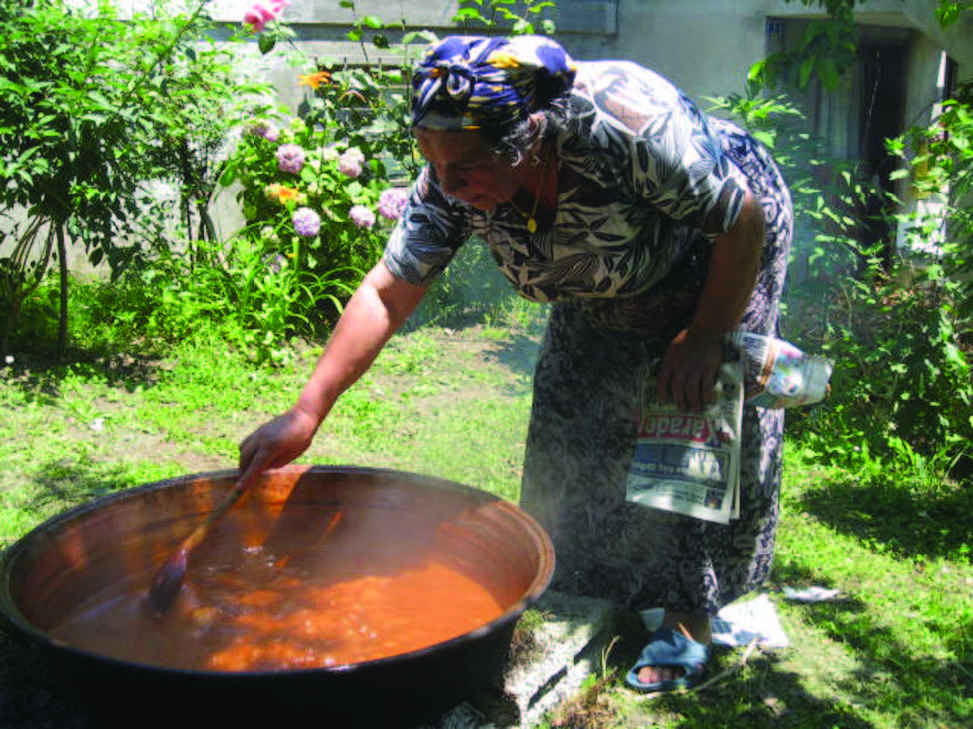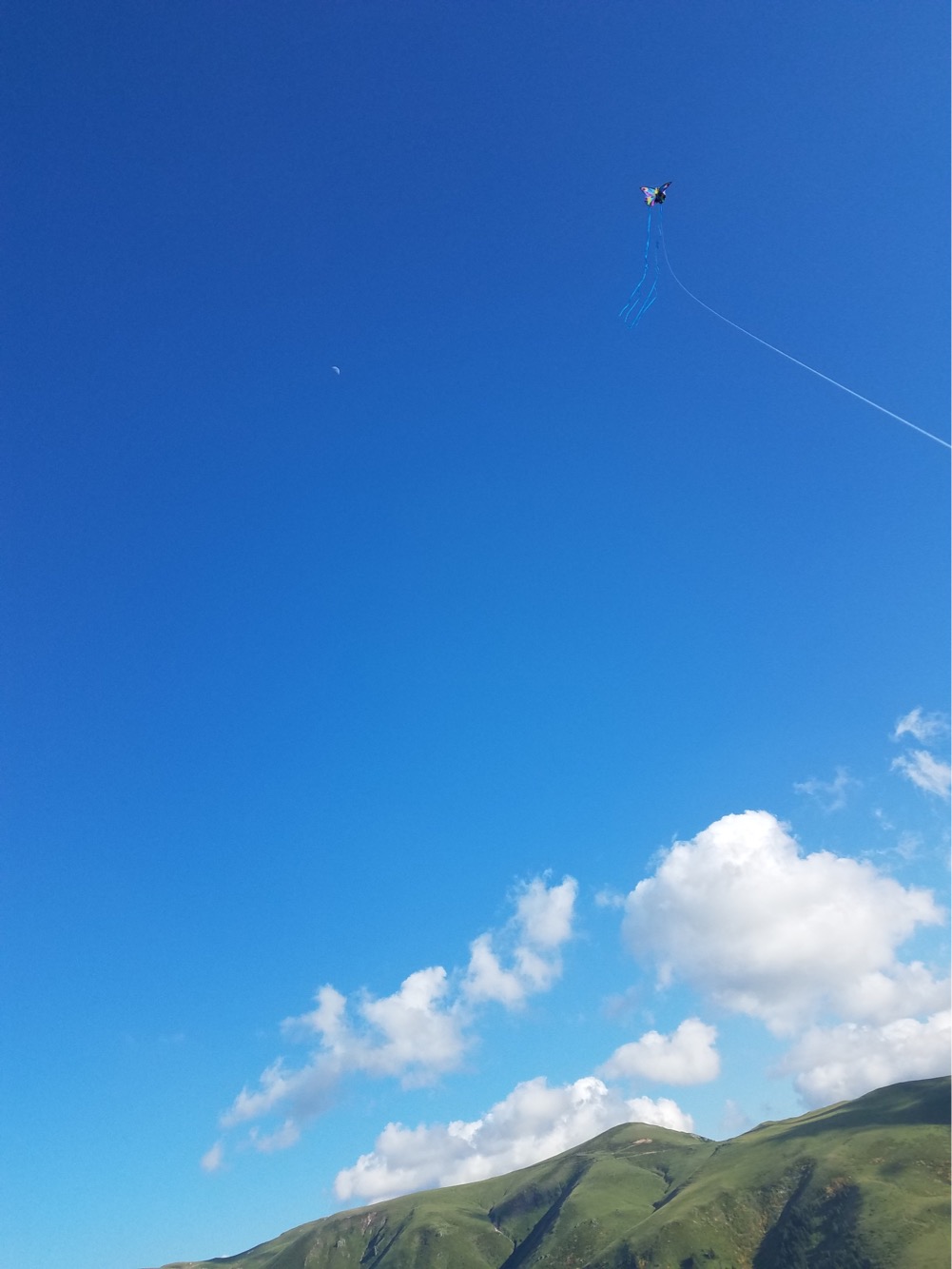Slowing down for Turkish molasses
This essay appeared in the Fall 2013 issue of Gastronomica magazine. Click here for a pdf version.
The heat doesn’t faze Sevim, my seventy-year-old mother-in-law, even though it’s already sweltering at six o’clock in the morning. ‘‘Buraya,’’ here, she says, dragging a stained neon-blue tarp under a tree heavy with mulberries. Twelve feet above, her octogenarian husband balances on a branch and waits for the signal. ‘‘Tamam,’’ okay, Sevim shouts, and Muzaffer begins shaking the bough. The leaves rustle and, suddenly, hundreds of the white du¨ t shower down, the plump fruit landing plippity-plop-plop on the plastic sheet.
‘‘Look out!’’ squeal my two sons as they dodge the fruity confetti.
June is pekmez, fruit molasses, time in Bes¸ikdu¨ zu¨ , the eastern Black Sea town in Turkey where my family is spending the summer, sans Hakki, my husband. In his birthplace, a hillside hamlet, men bob and weave through the berry-laden branches, taking care not to dislodge the ripe fruit before their wives say the word. Down below, the women sweat over enormous copper pans, pressing, stirring, and boiling the fruit’s juice until it thickens into a tangy, tawny molasses.
Pekmez has sweetened Turkish dishes since the eleventh century. Typically made from mulberries or grapes, ‘‘the healing syrup of Anatolia’’ is rich in iron, calcium, and potassium. Rural housewives like my mother-in-law believe molasses can cure colds, treat anemia, and even prevent cancer. Postpartum moms fortify themselves with pekmez mixed with water. At breakfast, Turks scoop it up with bread or, in my husband’s case, slurp it down by the spoonful.
With its bittersweet, slightly burnt flavor, homemade mulberry molasses can take some getting used to. I could say the same thing about Bes¸ikdu¨ zu¨ . Despite thirteen years of marriage and yearly visits to my in-laws’ rambling three-acre homestead, I’ve yet to acquire a taste for rural living `a la Turka. To my New Yorker sensibilities, life on the Silk Road is bucolic but backwards, and best for little boys gone wild.
Glancing up from my dictionary, I catch my sons skidding barefoot through Sevim’s harvest.
‘‘Stop that!’’ I scold, as my seven-year-old leaps onto a mound of mulberries. ‘‘You’ll ruin grandma’s pekmez.’’
But Sevim just sighs and adjusts her pink-and-black floral kerchief. She crisscrosses the corners at the base of her neck and knots the scalloped ends across her forehead.
‘‘Ne yapalim,’’ she says, and hoisting a bucket of berries onto her hip, pads over to me in her black rubber galoshes.
Confused, I mentally rifle through my rudimentary Turkish. ‘‘Yapmak’’ is ‘‘to do,’’ that much I know.
Before I can figure out what she means, Sevim dumps her haul onto the table, and starts picking through it, tossing out leaves, twigs, and overripe fruit. Gingerly, I poke my fingers into the heap. It’s sticky, slimy, and teeming with bugs.
‘‘Yuck,’’ I think, flicking an earwig off my wrist. ‘‘This is going to be a long three months.’’
My mother-in-law has worries of her own. The month before we arrived, a carload of holidaymakers drowned in a freak ferry accident. In the finger-pointing fallout Rahman, the head of Port Security—and the husband of Sevim’s eldest daughter—was arrested, presumably for negligence. Six weeks later, Rahman still hasn’t been formally charged, and no one knows when, or whether, he will be released.
‘‘How’s it going today?’’ Hakki asks when he calls one day in August.
‘‘Same as yesterday,’’ I deadpan. ‘‘Except now she’s picking grapes.’’
At noon Sevim teeters atop a rickety wooden ladder. Clusters of blue-black muscat grapes spill from a wicker basket. Half a mile down the rutted footpath that leads to her house, the clang of metal on bedrock booms like a metronome. Soon, the city will raze her prized decades-old arbor to make way for a new modern road.
I wonder aloud about the fate of the mulberry trees. Will they be cut down too?
Sevim shrugs, and, wordlessly, empties the basket into a copper tub, before sliding her bare feet into two plastic bag booties. Hitching up her skirt, she climbs in and starts stomping the grapes. She sloshes around a bit and then, ankle-deep in the purple slurry, turns to me and smiles.
‘‘I don’t get it,’’ I tell Hakki later. ‘‘Her son-in-law’s in jail. The town’s about to lop off half her land. But your mom just keeps making pekmez.’’
‘‘So?’’ he asks. ‘‘What else can she do?’’
At dusk a pungent aroma rises from the grape pekmez. Sevim squats on a tree stump, skimming the froth. Steam billows from the roiling syrup and for a moment she vanishes. Then, through the haze, I see her ladling molasses into a shallow bowl. She tips the dish sideways, and an amber film spreads across.
‘‘Tamam,’’ she says. It’s ready.
She pads into the house and returns with three smaller basins. Together, we tilt the heavy pan and the piping-hot molasses flows like lava.
After, Sevim leans the empty basin against the mulberry tree and motions for me to sit. A layer of caramelized sugar coats the pan. Grinning, Sevim traces a curlicue through it and then, with a flourish, licks her finger.
Suddenly, I am overcome. My fiftieth birthday is two days away and I’ve been brooding about growing old and losing my father two years before.
‘‘I miss my dad,’’ I stammer, biting back tears.
Sevim is silent for a moment. ‘‘Ne yapalim?’’ she says, looking up at the sky. He’s gone.
Then, at last, I understand what she means: Ne yapalim translates literally as ‘‘what-can-we-do.’’ But it’s not a question; it’s a mantra of acceptance.
I nod and watch her fill a jar with pekmez. As it falls from the spoon, it folds over on itself like ribbons of freshly blown glass. Then a lone bubble floats slowly to the surface.
Loss flavors every life, I realize. But serendipity does too. The wise heart embraces both.
Across the valley, the slate-gray sky pulses with lightning. By morning the last mulberries will be gone, swept away by the storm.
Catching Sevim’s eye, I point to the clouds. ‘‘Ne yapalim,’’ I murmur, and smiling, bring the pekmez to my lips.
What’s been your most eye-opening travel experience? I’d love to hear.



